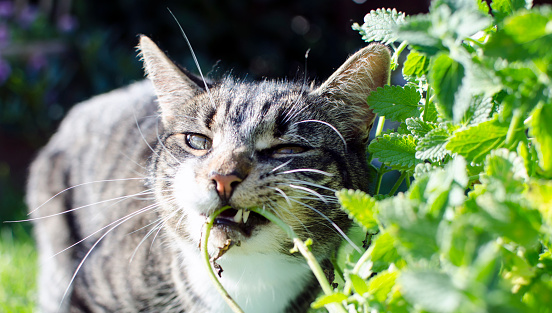
CAT HERBS
Herbs and plants have been used for a long time to help treat human ailments and relieve their symptoms. In the wild, animals will also seek out natural remedies when feeling unwell. There are many plants that have shown to have beneficial effects upon cats.
If you have herbs in your garden, you may notice your cat seeking them out. If you do not have a garden, or have an indoor cat, or simply want to enrich their time indoors, you can bring herbs into the house for them.
Herbs and plants that are dried or fresh from the garden are the best to offer to your cat. Do not be tempted to use essential oils because they cannot be broken down by the cat’s liver and so can build up to toxic levels in the cat’s body.
It is best to select 4 or 5 different herbs, at any one time, for them to explore and investigate. These can be put in a quiet area of your house where your cat likes to play, but ideally not where they sleep or eat. Watch as your cat investigates what they have found. You may notice them sniffing, batting, rolling in and even tasting, what has been left for them. You can leave this down for a few days if it is out of the way and can easily be hoovered up if it becomes too messy.
Alternatively, you can put the plants on a mat for an easier clean-up. It is important to let your cat introduce themselves to the herbs and use them as they wish. Do not force them to interact with the herbs, and do not feed them or mix them with their food.
What plants can we use at home to help our pet cats when they are feeling under the weather?
Catnip: Catnip is the obvious herb to start with. It is a member of the mint family that lots of cats are particularly fond of, as you may already know. Though it is worth noting that not all cats carry the gene that causes the excitable reaction, but they may still feel the following benefits:
- Calming and de-stressing - can be used to help with anxiety.
- Stimulant - can be used to increase activity.
- Can be used to relieve itchy skin.
Cat Thyme: Cat thyme can be used as an alternative for cats that do not like catnip. It is both soothing and encourages contentment.
Mint: Mint should only be used occasionally. Also, ensure your cat does not ingest a lot at once. Small amounts can be used to:
- Ease stomach discomfort.
- Relax.
- Help with dry, irritated skin.
- Repel pests.
- Do check which variety of mint you have, because some (such as Polish mint) are toxic to cats.
Basil: Basil has both antibacterial and anti-inflammatory properties. When made into a paste, it can be used topically to treat any insect bites that might be bothering your cat (and can be used on yourself!) It also has mild pain killing and decongestive properties and has been observed to relieve stress.
Parsley: Parsley is safe for cats when used in small doses, never let them have more than half a teaspoon and do not use at all if they have ever suffered from calcium oxalate stones. Its useful properties include:
- Antibacterial.
- Supports the immune system.
- Protects eyesight.
Dill: Dill can aid digestion, reduce bloating and is generally good for your cat’s digestive health.
Rosemary: Rosemary can help with:
- Digestion.
- Shiny coats.
- Healthy eyesight.
- And is antifungal.
Thyme: Thyme has a lot of similar properties to rosemary, but in addition to this is:
- A mild disinfectant.
- Antiviral.
- Antibacterial.
- Repels worms.
Barley Grass: Barley grass has become a popular food supplement amongst humans, but it also can be used (in small quantities) by your cat. It can:
- Boost the immune system.
- Help build bone and muscle.
- Control the acid balance in your cat’s body.
Dandelion Root:
- Anti-itching properties.
- Helps reduce the symptoms of allergies.
- Good for digestion and liver function.
Valerian Root: Valerian Root is another cat stimulant that can be used as an alternative to catnip. It can increase your cat’s activity and can be used to make them exercise. In addition to this, it is also good for the immune system.
Liquorice Root: Like many other items on this list, liquorice root has anti-itch properties so is great for soothing irritated skin. It also sooths mucus membranes, so can be used to treat respiratory conditions like colds. It can also help with endocrine and digestive issues.
Marshmallow Root: Offers support to the mucous membranes in the respiratory and digestive systems.
Rose Hip: Rose hips are high in vitamin c. In addition to this, is supports healthy bones, joints, and the immune system. It can be administered in powdered form.
Witch Hazel: Witch hazel can be used to treat cat acne when applied using cotton wool on your cat’s chin.
Chamomile and Lavender:
- Soothing.
- Calming.
- Relaxing.
Calendula:
- Builds confidence.
- Anti-inflammatory.
- Healing properties.
Echinacea:
- Boosts immune system.
- Promotes respiratory health.
Chickweed:
- Aids digestion.
- Helps with furballs.
Goldenseal:
- Antibacterial.
- Helps with symptoms of allergies.
Over time, if you continue to leave plants for your cat you will learn which they favour. If you give them a wide selection, they will be able to seek out the plants with the properties that they desire.
None of these plants are suitable to be offered to your cat in large quantities and in doing so, can make your cat become unwell. Moderation is key.
If your cat is on medication, or has any pre-existing medical conditions, please first consult your vet before offering your cat any herbal remedies.